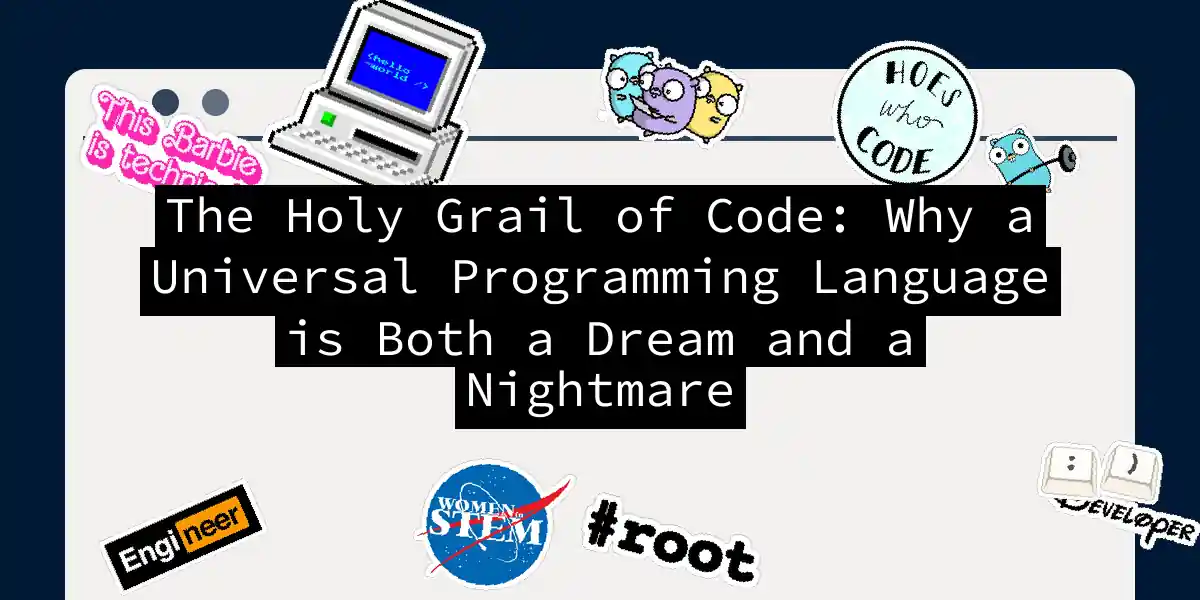Picture this: you’re standing in front of a toolbox containing 27 different hammers. Each claims to be “the one true hammer” while secretly being terrible at driving nails. That’s our programming ecosystem in 2025 - except the hammers occasionally tweet about their superiority in threaded environments. The quest for a Universal Programming Language (UPL) has been the tech world’s equivalent of chasing unicorns on roller skates, but let’s dissect why this siren song keeps luring developers onto the rocks.
Run Anywhere] A --> C[Single Syntax
to Rule Them All] A --> D[No More
Language Wars] B --> E[Reality Check:
Cross-Platform Bugs] C --> F[Reality Check:
Paradigm Collisions] D --> G[Reality Check:
Religious Wars
About Semicolons]
The Allure of Digital Babel Fish
The theoretical benefits make product managers salivate:
- Economic Efficiency: No more rewriting financial systems from COBOL to Java to Rust every decade
- Cognitive Relief: Imagine never having to explain to juniors why
NaN === NaNreturns false… in any language - Portability Nirvana: Code that runs on your smart fridge and NASA’s Mars rover (assuming the rover has enough RAM for Electron apps) But let’s crunch some numbers. The 2025 Stack Overflow survey shows developers use 4.7 languages weekly. My personal record is 6 before lunch (including CSS - fight me). Could one syntax truly handle:
# Functional meets OOP meets quantum computing?
def process_data(data: List[Qubit]) -> Observable:
return data | pipe(
map(λ x: x.entangle()),
filter(lambda q: q.spin > 0.7),
reduce(QuantumSuperposition())
).subscribe(
on_next=print,
on_error=teleport_to_alternate_universe
)
Historical Ghosts of UPL Past
The UNIX priests of 1958 tried conjuring UNCOL (Universal Computer Oriented Language) - a compiler intermediate so abstract it made monads look straightforward. It failed spectacularly, though not before:creating the template for every “Write Once, Debug Everywhere” horror story since. Modern contenders follow similar patterns:
| Approach | Promise | Reality |
|---|---|---|
| Intermediate ILs | Hardware abstraction | “Works on my VM!” syndrome |
| Transpilers | Target any language | Dependency hell² |
| Superset langs | Expand functionality | TypeScript’s “any” epidemic |
The Paradigm Paradox
Programming languages aren’t just syntax - they’re philosophies. Trying to merge paradigms is like teaching Kant to argue with a GPT-7 instance:
// OOP purity in a functional world
public class Monad<T> implements Functor<Optional<?>> {
private final T value;
public Monad(T val) {
this.value = Optional.ofNullable(val)
.orElseThrow(() -> new MaybeNothingException());
}
public <R> Monad<R> map(Function<? super T, ? extends R> mapper) {
return new Monad<>(value.map(mapper).orElseGet(() -> null));
}
}
The result? A type-system Rube Goldberg machine that solves yesterday’s problems while creating tomorrow’s stack traces.
Survival Guide for the UPL Apocalypse
While we wait for the messiah language (spoiler: it’s Rust… until next year), here’s how to navigate:
- Embrace the Polyglot
# Build systems love diversity! $ npm install --save-dev typescript @babel/core webpack $ cargo add wasm-bindgen $ go get -u github.com/gopherjs/gopherjs - Master the Matrixflowchart LR A[Problem Space] --> B{Data-heavy?} B -->|Yes| C[Python/Pandas] B -->|No| D{Concurrent?} D -->|Yes| E[Go/Rust] D -->|No| F{Web?} F -->|Yes| G[TypeScript] F -->|No| H[C#/Java]
- Learn Language-Oriented Programming
Create your own domain-specific languages (DSLs) instead of waiting for salvation:class KitchenDSL def self.recipe(&block) RecipeBuilder.new(&block).serve end end KitchenDSL.recipe do ingredient 'Flour', 500.grams step :mix, speed: 3, time: 2.minutes bake at: 180.c, until: golden_brown end
The Verdict: Beautiful Disaster
A true UPL would need to be:
- Static and dynamic
- Functional and imperative
- Low-level and abstract
- Readable and concise In other words, it must simultaneously be a sports car, cargo ship, and bicycle - while being maintained by developers who still argue about tabs vs spaces. The dystopian trap snaps shut when we realize that language diversity drives innovation. Every new syntax experiment (looking at you, Zig) teaches us better ways to structure thought. The real universal language isn’t code - it’s our shared struggle to transform coffee into abstract syntax trees. So next time someone promises “one language to rule them all,” smile politely and ask: “Will it fix my legacy codebase… or just give it new ways to segfault?” The answer might surprise you - or at least provide good material for the inevitable Hacker News debate.
